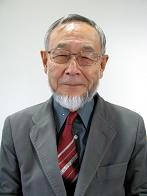Keiji Morokuma
Keiji Morokuma ( Japanese 諸 熊 奎 治 , Morokuma Keiji ; born July 12, 1934 in Kagoshima , Kagoshima Prefecture ; † November 27, 2017 in Kyoto ) was a Japanese theoretical chemist .
Morokuma was a student of Kenichi Fukui (1918-1998) at the University of Kyoto , one of the pioneers of quantum chemistry in Japan and Nobel Prize winner, where he received his doctorate in 1963 . He was a professor at Emory University , where he retired, and a senior research fellow at his alma mater's Fukui Institute for Fundamental Chemistry . In 1970 he became a Sloan Research Fellow .
He developed the ONIOM method, a process that integrates molecular orbit methods and those of molecular mechanics on several levels and uses it to calculate large molecules. He examined potential surfaces in chemical reactions and reactions and the structure of nanoparticles, proteins (also in excited states) and transition metal complexes as well as the photochemistry of biomolecules.
In 1991 he was the first to receive the Schrödinger Medal . In 1978 he was awarded the Prize of the International Academy of Quantum Molecular Science , of which he was a member, in 1992 the Prize of the Japanese Chemical Society, in 2005 the Fukui Medal of the Asian Pacific Association of Theoretical & Computational Chemists, and in 2008 the Imperial Prize and Prize of the Japanese Academy of the sciences .
Web links
Individual evidence
- ↑ Obituary , accessed December 4, 2017 ( Japanese )
- ↑ biographical data, publications and Academic pedigree of Keiji Morokuma at academictree.org, accessed on January 3 of 2019.
| personal data | |
|---|---|
| SURNAME | Morokuma, Keiji |
| ALTERNATIVE NAMES | 諸 熊 奎 治 (Japanese) |
| BRIEF DESCRIPTION | Japanese chemist |
| DATE OF BIRTH | July 12, 1934 |
| PLACE OF BIRTH | Kagoshima |
| DATE OF DEATH | November 27, 2017 |
| Place of death | Kyoto |
